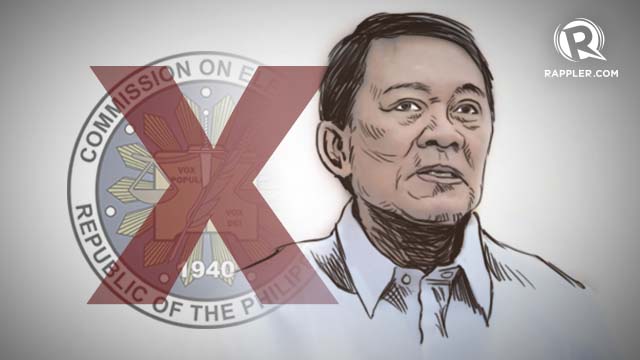SUMMARY
This is AI generated summarization, which may have errors. For context, always refer to the full article.

MANILA, Philippines – Controversy hounds Malacanang’s choices for the two vacancies in the Commission on Elections (Comelec) because there is no transparency in the vetting process, election watchdogs said.
At the same time, Malacanang’s short list for the two positions lacks qualfiied nominees, partly due to the decision of civil society groups against making their own recommendations.
The Aquino administration was delivered a one-two punch recently when former Ambassador and Lanao del Norte Rep. Macabangkit Lanto and election lawyer Maria Bernadette Sardillo declined their respective appointments to replace retired Commissioners Rene Sarmiento and Armando Velasco.
Sardillo was the first to decline her appointment over the weekend, followed by Lanto on Monday, March 11. Both cited family pressure in rejecting the appointment.
But reports said Sardillo’s appointment was blocked by Commissioner Grace Padaca and Justice Secretary Leila de Lima due to the election cases she had handled and political personalities she had represented.
On the other hand, government insiders said President Aquino’s political lieutenants asked Lanto to decline his appointment, after Aquino blew his top over the controversy.
Lanto was unseated in 1994 by the House of Representatives Electoral Tribunal as Lanao del Norte Representative after it discovered that the election returns and municipal certificate of canvass in his area had been tampered with.
The Malacañang boo-boo leaves the Comelec with still only 5 commissioners.
Where are civil society groups?
The bungled appointments of Lanto and Sardillo is a symptom of the inherent weaknesses of Malacanang’s selection process, Namfrel’s membership committee chairman Damaso Magbual said.
“There is no transparency in the selection process. There is no consultation,” Magbual said.
Transparency and Accountability Network (TAN) executive director Vincent Lazatin said the “opaque process” through which the Palace vets the nominees results in “sloppy” appointments.
With the public out of the loop, it is no surprise that certain characters faced with conflict-of-interest situations get shortlisted, according to Namfrel secretary-general Eric Alvia.
But election watchdogs and other stakeholders should share part of the blame for the less than satisfactory screening of applicants.
For the two Comelec vacancies, civil society groups chose not to submit their own nominees to Malacañang. In the past, they used to submit a list to the President.
Magbual explained however that civil society groups could hardly be faulted for staying away this time, considering how Malacañang treated former Commissioner Augusto Lagman, who was endorsed by election watch groups.
Lagman served in Comelec for only a year—from April 2011 to April 2012. The bicameral Commission on Appointments did not confirm his appointment.
Instead of issuing a reappointment or persuading its allies to confirm him, the Palace dropped Lagman like a hot potato for political reasons, Magbual said. Senate President Juan Ponce Enrile had apparently objected to his appointment because of his Namfrel connections.
“We lost faith in the system. We are no longer confident that Malacañang would even consider our nominees,” Magbual added.
It has not always been this way.
Ignoring stakeholders
In 2011, with the retirement of former Justice Jose Melo as chairman and two vacancies in the commissioner’s post, several organizations, that included Namfrel, TAN, the Bishops’ Businessmen Conference for Human Development and the Catholic Bishops’ Conference of the Philippines, submitted to the President their choice appointees.
For the chairmanship, the Search Committee for Comelec nominees led by former Comelec chairman Christian Monsod pushed for either Atty. Carlos Medina of the Legal Network for Truthful Elections and corporate lawyer Antonio Pastelero.
For the two commissioner’s posts, they recommended Caridad Manarang of Namfrel; information technology expert Baltazar Endriga; and National College of Public Administration Dean Edna Estifania Co for inclusion in the shortlist.
None of the nominees were picked. Veteran election lawyer Sixto Brillantes Jr was appointed chairman, while Lagman and private practitioner Christian Robert Lim were appointed as commissioners.
Namfrel took consolation with the appointment of Lagman, an IT expert. Lagman managed the operation quick count of Namfrel.
But the way the Palace handled the CA’s failure to confirm Lagman prompted Namfrel and other election sectors to keep a distance from the selection process.
Politicizing Comelec
The appointment of Comelec officials is a politicized process. The President, after all, ultimately makes the appointments.
Realizing that independence and integrity should be the primary criteria for applicants, civil society groups had pushed for their participation in the screening process.
Under the Ramos government, they were able to lobby for the appointment of Commissioner Teresita Dy-Liacco Flores. During the regime of former President Gloria Macapagal-Arroyo, they successfully lobbied for the appointment of former Commissioner Resurreccion Borra.
It was during Arroyo’s time that some of the most controversial appointments were made. Former Mandaluyong Mayor Benjamin Abalos — who became Comelec chairman –found himself in the middle of a bribery scandal on the botched broadband deal with China’s ZTE. Another commissioner, Virgilio Garcillano, was caught on tape talking to Mrs Arroyo about votes in the 2004 presidential elections.
It seems the Aquino government is following in Arroyo’s footsteps.
Brillantes’ appointment as chairman was met with skepticism, considering his background as a poll lawyer of politicians of different shades. Aquino’s second appointment—former Isabela governor Grace Padaca—didn’t help, as she was a member of the ruling Liberal Party before her appointment to Comelec.
The recent appointments were clearly political. Sardillo formerly served as a lawyer for the Tingas in Taguig, who are Aquino’s political allies. Lanto was pushed by Sen Franklin Drilon, an LP stalwart and campaign manager for the May polls.
Despite the embarrassing results, Lazatin said civil society groups will continue to stay away from the selection process. “There’s no use. We’ve been trying to no avail.” – Rappler.com
Add a comment
How does this make you feel?
There are no comments yet. Add your comment to start the conversation.